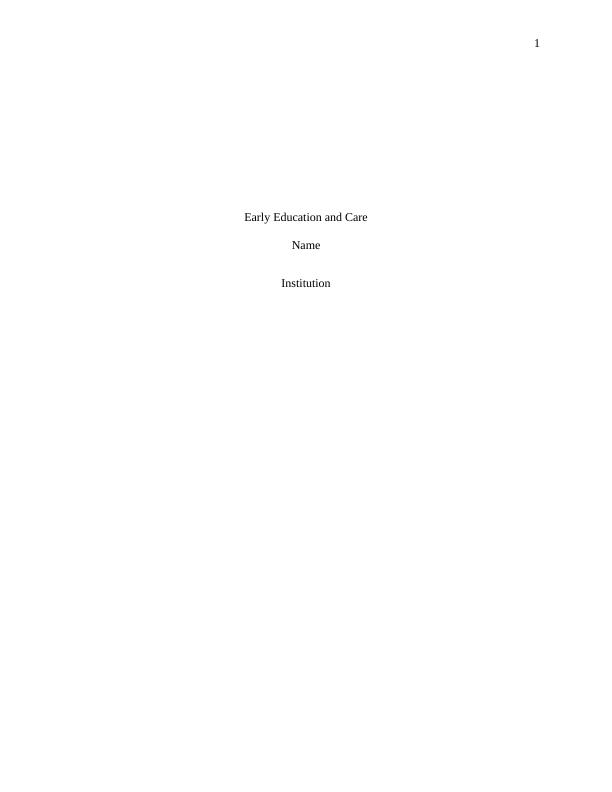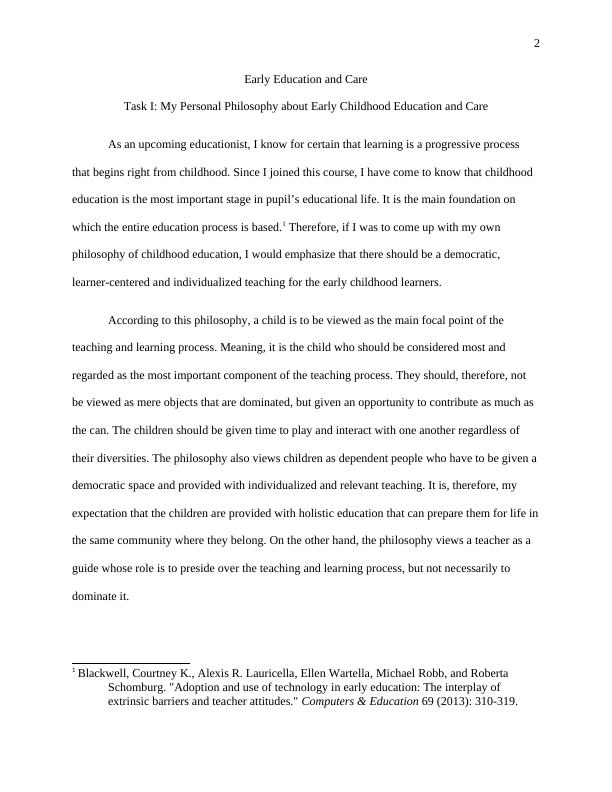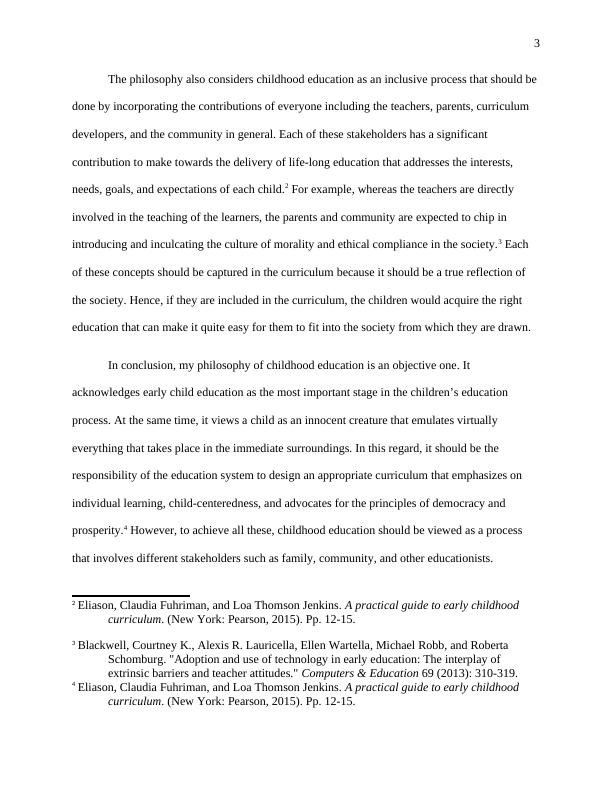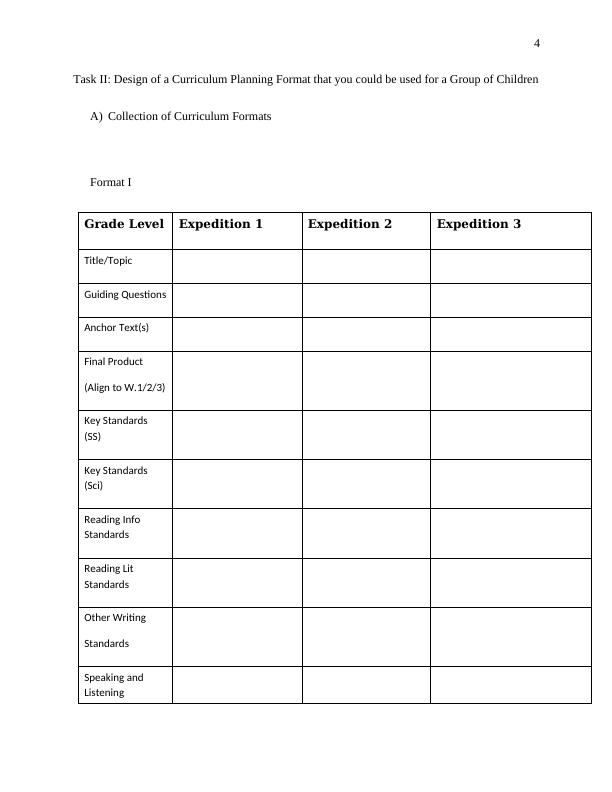Early Education and Care
Added on 2023-06-11
15 Pages2943 Words478 Views
1
Early Education and Care
Name
Institution
Early Education and Care
Name
Institution

2
Early Education and Care
Task I: My Personal Philosophy about Early Childhood Education and Care
As an upcoming educationist, I know for certain that learning is a progressive process
that begins right from childhood. Since I joined this course, I have come to know that childhood
education is the most important stage in pupil’s educational life. It is the main foundation on
which the entire education process is based.1 Therefore, if I was to come up with my own
philosophy of childhood education, I would emphasize that there should be a democratic,
learner-centered and individualized teaching for the early childhood learners.
According to this philosophy, a child is to be viewed as the main focal point of the
teaching and learning process. Meaning, it is the child who should be considered most and
regarded as the most important component of the teaching process. They should, therefore, not
be viewed as mere objects that are dominated, but given an opportunity to contribute as much as
the can. The children should be given time to play and interact with one another regardless of
their diversities. The philosophy also views children as dependent people who have to be given a
democratic space and provided with individualized and relevant teaching. It is, therefore, my
expectation that the children are provided with holistic education that can prepare them for life in
the same community where they belong. On the other hand, the philosophy views a teacher as a
guide whose role is to preside over the teaching and learning process, but not necessarily to
dominate it.
1 Blackwell, Courtney K., Alexis R. Lauricella, Ellen Wartella, Michael Robb, and Roberta
Schomburg. "Adoption and use of technology in early education: The interplay of
extrinsic barriers and teacher attitudes." Computers & Education 69 (2013): 310-319.
Early Education and Care
Task I: My Personal Philosophy about Early Childhood Education and Care
As an upcoming educationist, I know for certain that learning is a progressive process
that begins right from childhood. Since I joined this course, I have come to know that childhood
education is the most important stage in pupil’s educational life. It is the main foundation on
which the entire education process is based.1 Therefore, if I was to come up with my own
philosophy of childhood education, I would emphasize that there should be a democratic,
learner-centered and individualized teaching for the early childhood learners.
According to this philosophy, a child is to be viewed as the main focal point of the
teaching and learning process. Meaning, it is the child who should be considered most and
regarded as the most important component of the teaching process. They should, therefore, not
be viewed as mere objects that are dominated, but given an opportunity to contribute as much as
the can. The children should be given time to play and interact with one another regardless of
their diversities. The philosophy also views children as dependent people who have to be given a
democratic space and provided with individualized and relevant teaching. It is, therefore, my
expectation that the children are provided with holistic education that can prepare them for life in
the same community where they belong. On the other hand, the philosophy views a teacher as a
guide whose role is to preside over the teaching and learning process, but not necessarily to
dominate it.
1 Blackwell, Courtney K., Alexis R. Lauricella, Ellen Wartella, Michael Robb, and Roberta
Schomburg. "Adoption and use of technology in early education: The interplay of
extrinsic barriers and teacher attitudes." Computers & Education 69 (2013): 310-319.

3
The philosophy also considers childhood education as an inclusive process that should be
done by incorporating the contributions of everyone including the teachers, parents, curriculum
developers, and the community in general. Each of these stakeholders has a significant
contribution to make towards the delivery of life-long education that addresses the interests,
needs, goals, and expectations of each child.2 For example, whereas the teachers are directly
involved in the teaching of the learners, the parents and community are expected to chip in
introducing and inculcating the culture of morality and ethical compliance in the society.3 Each
of these concepts should be captured in the curriculum because it should be a true reflection of
the society. Hence, if they are included in the curriculum, the children would acquire the right
education that can make it quite easy for them to fit into the society from which they are drawn.
In conclusion, my philosophy of childhood education is an objective one. It
acknowledges early child education as the most important stage in the children’s education
process. At the same time, it views a child as an innocent creature that emulates virtually
everything that takes place in the immediate surroundings. In this regard, it should be the
responsibility of the education system to design an appropriate curriculum that emphasizes on
individual learning, child-centeredness, and advocates for the principles of democracy and
prosperity.4 However, to achieve all these, childhood education should be viewed as a process
that involves different stakeholders such as family, community, and other educationists.
2 Eliason, Claudia Fuhriman, and Loa Thomson Jenkins. A practical guide to early childhood
curriculum. (New York: Pearson, 2015). Pp. 12-15.
3 Blackwell, Courtney K., Alexis R. Lauricella, Ellen Wartella, Michael Robb, and Roberta
Schomburg. "Adoption and use of technology in early education: The interplay of
extrinsic barriers and teacher attitudes." Computers & Education 69 (2013): 310-319.
4 Eliason, Claudia Fuhriman, and Loa Thomson Jenkins. A practical guide to early childhood
curriculum. (New York: Pearson, 2015). Pp. 12-15.
The philosophy also considers childhood education as an inclusive process that should be
done by incorporating the contributions of everyone including the teachers, parents, curriculum
developers, and the community in general. Each of these stakeholders has a significant
contribution to make towards the delivery of life-long education that addresses the interests,
needs, goals, and expectations of each child.2 For example, whereas the teachers are directly
involved in the teaching of the learners, the parents and community are expected to chip in
introducing and inculcating the culture of morality and ethical compliance in the society.3 Each
of these concepts should be captured in the curriculum because it should be a true reflection of
the society. Hence, if they are included in the curriculum, the children would acquire the right
education that can make it quite easy for them to fit into the society from which they are drawn.
In conclusion, my philosophy of childhood education is an objective one. It
acknowledges early child education as the most important stage in the children’s education
process. At the same time, it views a child as an innocent creature that emulates virtually
everything that takes place in the immediate surroundings. In this regard, it should be the
responsibility of the education system to design an appropriate curriculum that emphasizes on
individual learning, child-centeredness, and advocates for the principles of democracy and
prosperity.4 However, to achieve all these, childhood education should be viewed as a process
that involves different stakeholders such as family, community, and other educationists.
2 Eliason, Claudia Fuhriman, and Loa Thomson Jenkins. A practical guide to early childhood
curriculum. (New York: Pearson, 2015). Pp. 12-15.
3 Blackwell, Courtney K., Alexis R. Lauricella, Ellen Wartella, Michael Robb, and Roberta
Schomburg. "Adoption and use of technology in early education: The interplay of
extrinsic barriers and teacher attitudes." Computers & Education 69 (2013): 310-319.
4 Eliason, Claudia Fuhriman, and Loa Thomson Jenkins. A practical guide to early childhood
curriculum. (New York: Pearson, 2015). Pp. 12-15.

4
Task II: Design of a Curriculum Planning Format that you could be used for a Group of Children
A) Collection of Curriculum Formats
Format I
Grade Level Expedition 1 Expedition 2 Expedition 3
Title/Topic
Guiding Questions
Anchor Text(s)
Final Product
(Align to W.1/2/3)
Key Standards
(SS)
Key Standards
(Sci)
Reading Info
Standards
Reading Lit
Standards
Other Writing
Standards
Speaking and
Listening
Task II: Design of a Curriculum Planning Format that you could be used for a Group of Children
A) Collection of Curriculum Formats
Format I
Grade Level Expedition 1 Expedition 2 Expedition 3
Title/Topic
Guiding Questions
Anchor Text(s)
Final Product
(Align to W.1/2/3)
Key Standards
(SS)
Key Standards
(Sci)
Reading Info
Standards
Reading Lit
Standards
Other Writing
Standards
Speaking and
Listening

End of preview
Want to access all the pages? Upload your documents or become a member.
Related Documents
Children's Learning Perspectiveslg...
|8
|2239
|91
Personal Philosophy of Early Childhood Educationlg...
|5
|815
|77
My Professional Philosophy on Early Childhood Educationlg...
|3
|612
|211
Early Childhood Education and Care | Studylg...
|6
|1258
|10
Teaching Philosophy Based on EYLFlg...
|5
|1069
|345
Emergent Philosophy of Educationlg...
|14
|4193
|80
